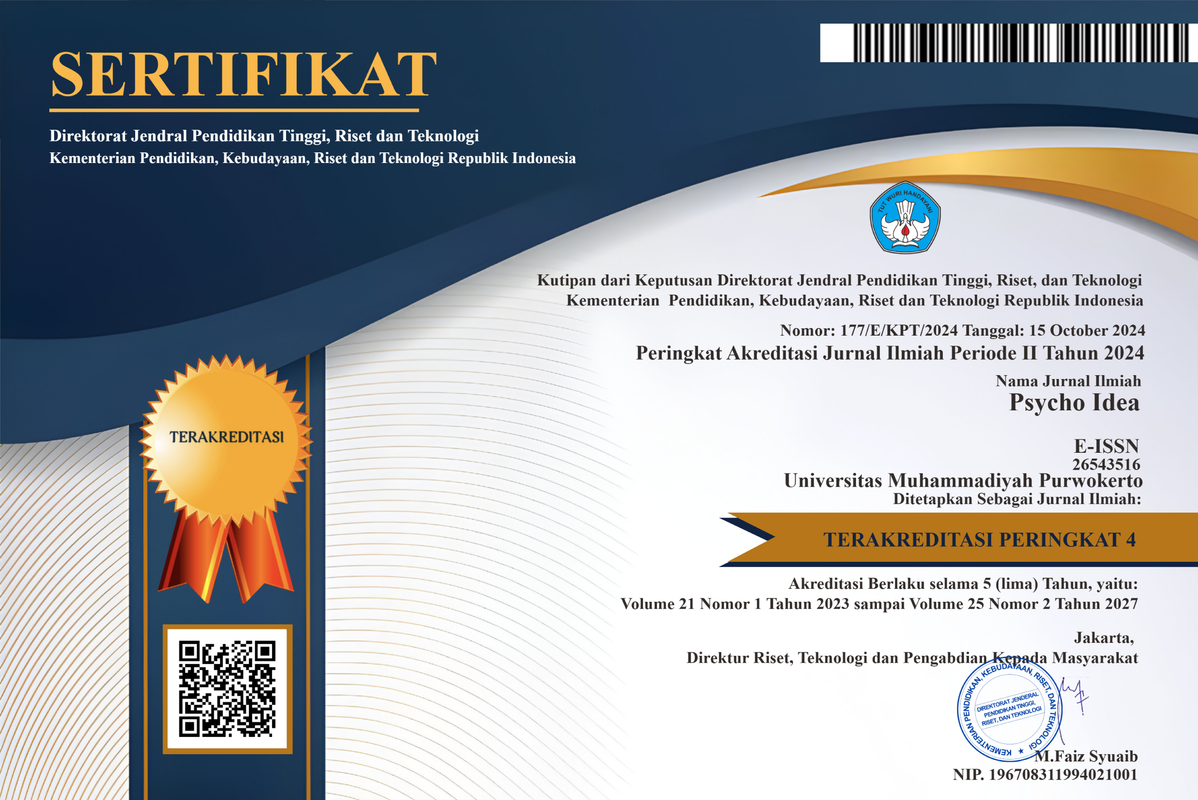STUDI KASUS TENTANG PROSES PENGAMBILAN KEPUTUSAN MENJADI LESBI
DOI:
https://doi.org/10.30595/psychoidea.v16i1.2499Abstract
The purpose of this study is to examine how the decision-making process becomes lesbian. This research is a qualitative research with case study approach. This research was conducted in Purwokerto Banyumas Regency. Determination of informant in this research using snowball technique method with criterion of informant is lesbian who ever have relationship with same type. Based on these criteria, the researcher get 3 lesbian informants that are M, I and R. Data collecting method by interview and observation. Test data validity by using triangulation method. Data analysis technique used is interactive model consisting of data reduction, data presentation and conclusion.The results of this study describes how the decision making process made a lesbian to be lesbian. The existence of biological factors, psychosocial and psychological on the life of the informant who influential in decision making. Based on the study of the reasons for being lesbian, the responses obtained as data are: for informants M because of the comfortable feel of hanging out with women; informant I is because of hatred of men, because of traumatic experience since childhood witnessed his father's abusive treatment to his mother, so that I appear the feeling of hate toward men, while informant R the reason to be lesbian is because of comfortable pair with woman and physically informant R feel tomboy since childhood. Based on the study collecting information about the life of lesbian hence obtained data that the three informants equally obtain information through lesbian community. Based on the study of how the views of himself and the public about a lesbian? then the data obtained that: Informants M and R admitted that do not care about the opinions of others about lesbi, whereas according to informant I every human being has the right to argue anything about lesbi life. Initially the three informants have no consideration whatsoever to choose to be lesbian and still live lesbiannya life samapai this time. The three informants will remain lesbi and live life with their respective spouses.
Â
Keywords: Personal Decision Making Process, Male, Lesbian.
References
Basyaib, F. (2006).Teori Pembuatan Keputusan. Jakarta : Penerbit Grasindo
Crew, D., & Crawford, M. (2015). Expolring the Role being of Being Out a Queer Person’s Self Compassion. Journal of Gay & Lesbi Social Service. 27 (2), 172-186
Desmita.(2008). Psikologi Perkembangan. Bandung : Penerbit Remaja Rosdakarya
Engel, F,J., Blackwell, R,D., & Miniard,P,W. (1994). Perilaku Konsumen (Terjemah : FX. Budianto), Jakarta : Penerbit Bina Rupa
Fahmi, I. (2014). Proses Pengambilan Keputusan Menjadi Istri Kedua dalam Perkawinan Poligami pada Wanita Berpendidikan Tinggi. Psympathie, Jurnal Ilmiah Psikologi, 1, (2), 231-243.
Irawan, A, A. (2015). Aku Adalah Gay (Motif yang Melatar Belakangi Pilihan Menjadi Gay). Jurnal Bimbingan dan Konseling 4, (1), 1-11.
Kartono, K. (2007). Psikologi Anak. Bandung: Penerbit Mandar Maju.
Kusuma, D, A. (2014). Pembentukan Perilaku Seksual pada Pasangan Lesbi dan Gay di Yogyakarta Skripsi tidak diterbitkan. Universitas Negeri Yogyakarta.
Maslim, R (2013). Diagnosis Gangguan Jiwa Rujukan Ringkas dari PPDGJ III dan DSM-5. Jakarta : PT Nuh Jaya
Nevid,.Rathus & Greene.(2003). Psikologi Abnormal. Jakarta: Penerbit Erlangga.
Pontotoring, M., (2012), Kaum Lesbian di Manado, https://media.neliti.com/media/publications/932-ID-kaum-lesbian-di-kota-manado.pdf
Singgih, D, S & Singgih, D, S. 2007. Psikologi Remaja. Jakarta: Penerbit Gunung Mulia.
Soetjiningsih. (2004). Tumbuh Kembang Remaja dan Permasalahannya. Jakarta: CV Sagung Seto.
Suharnan. (2005). Psikologi Kognitif. Surabaya : Srikandi
Published
Issue
Section
License
Authors published in this journal agree to the following terms:
- The copyright of each article is retained by the author (s) without restrictions
- The journal allows the author(s) to retain publishing rights without restrictions
- The author grants the journal the first publication rights with the work simultaneously licensed under the Creative Commons Attribution License, allowing others to share the work with an acknowledgment of authorship and the initial publication in this journal.
- Authors may enter into separate additional contractual agreements for the non-exclusive distribution of published journal versions of the work (for example, posting them to institutional repositories or publishing them in a book), with acknowledgment of their initial publication in this journal
- Authors are permitted and encouraged to post their work online (For example in the Institutional Repository or on their website) before and during the submission process, as this can lead to productive exchanges, as well as earlier and larger citations of published work
- Articles and all related material published are distributed under a Creative Commons Attribution-4.0 International Public License (CC - BY 4.0).
License
Psycho Idea is licensed under a Creative Commons Attribution- 4.0 International Public License (CC - BY 4.0).
You are free to :
Share — copy and redistribute the material in any medium or format
Adapt — remix, transform, and build upon the material for any purpose, even commercially











